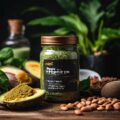Embracing Plant Power: A Compassionate Guide to Vegan Athlete Nutrition
As more athletes embrace a plant-based lifestyle, the world of vegan athlete nutrition continues to evolve and inspire. This guide celebrates the power of plants to fuel athletic performance while promoting compassion for animals and the planet. Whether you’re a seasoned vegan athlete or just starting your journey, this article will provide you with nourishing insights to support your active lifestyle.
The Heart of Vegan Athlete Nutrition: Whole Foods and Mindful Eating
At the core of vegan athlete nutrition lies a foundation of whole, plant-based foods. By focusing on nutrient-dense options like fruits, vegetables, whole grains, legumes, nuts, and seeds, athletes can obtain all the essential nutrients needed for optimal performance and recovery. The key is to approach nutrition with mindfulness and intention, savoring each meal as an opportunity to nourish both body and soul.
Some nutrient-rich foods to include in your vegan athlete diet:
- Leafy greens (spinach, kale, collards) for iron and calcium
- Colorful fruits and vegetables for antioxidants and vitamins
- Quinoa, brown rice, and oats for complex carbohydrates
- Lentils, beans, and tofu for protein
- Nuts and seeds for healthy fats and minerals
Protein: Building Blocks of Compassion
One of the most common concerns for vegan athletes is protein intake. However, with thoughtful meal planning, it’s entirely possible to meet protein needs through plant-based sources. By incorporating a variety of protein-rich foods throughout the day, athletes can support muscle growth and recovery while aligning with their ethical values.
Some excellent vegan protein sources include:
- Legumes (lentils, chickpeas, black beans)
- Soy products (tofu, tempeh, edamame)
- Seitan (wheat protein)
- Quinoa and other whole grains
- Nuts and seeds (almonds, pumpkin seeds, chia seeds)
Remember, it’s not just about the quantity of protein, but also the quality and variety. By consuming a diverse range of plant proteins, you ensure a complete amino acid profile to support your athletic endeavors.
Fueling Performance with Plant-Based Energy
Carbohydrates are the primary fuel source for high-intensity exercise, and a vegan diet naturally lends itself to ample carbohydrate intake. Whole grains, fruits, and starchy vegetables provide the energy needed for training and competition while offering additional benefits such as fiber, vitamins, and minerals.
To optimize your energy levels, focus on:
- Whole grains like quinoa, brown rice, and oats
- Sweet potatoes and other starchy vegetables
- Fresh and dried fruits
- Legumes, which provide both carbohydrates and protein
By choosing complex carbohydrates, you’ll maintain steady energy levels and avoid the crashes associated with simple sugars.
Nourishing Your Body and Soul with Essential Nutrients
While a well-planned vegan diet can meet most nutritional needs, there are a few key nutrients that require special attention:
- Vitamin B12: Essential for nerve function and red blood cell formation. Supplement or consume fortified foods.
- Iron: Pair iron-rich plant foods with vitamin C sources to enhance absorption.
- Omega-3 fatty acids: Consider algae-based supplements or include foods like flaxseeds and walnuts.
- Vitamin D: Spend time outdoors and consider supplements, especially in low-sunlight areas.
- Zinc: Found in whole grains, legumes, and nuts.
By mindfully incorporating these nutrients into your diet, you’ll support not only your athletic performance but also your overall well-being.
Hydration: The Essence of Life and Performance
Proper hydration is crucial for all athletes, and vegan athletes are no exception. Water is the foundation of life, and staying well-hydrated supports every aspect of athletic performance and recovery. In addition to plain water, consider incorporating hydrating foods and electrolyte-rich beverages into your routine:
- Coconut water for natural electrolytes
- Watermelon and other juicy fruits
- Herbal teas and infusions
- Homemade sports drinks with natural ingredients
Listen to your body’s thirst cues and remember that hydration needs may increase with intense exercise or hot weather.
FAQ: Nurturing Your Vegan Athlete Journey
Q1: Can I really build muscle on a vegan diet?
A: Absolutely! With proper nutrition and training, vegan athletes can build muscle just as effectively as non-vegan athletes. Focus on consuming adequate protein from varied plant sources, along with a balanced intake of carbohydrates and healthy fats.
Q2: How can I ensure I’m getting enough iron as a vegan athlete?
A: Include iron-rich plant foods like leafy greens, legumes, and fortified cereals in your diet. Pair these with vitamin C sources (like citrus fruits or bell peppers) to enhance iron absorption. If concerned, consult with a healthcare provider about supplementation.
Q3: What are some quick, high-protein vegan snacks for athletes?
A: Great options include hummus with veggie sticks, trail mix with nuts and seeds, smoothies with plant-based protein powder, or nut butter on whole-grain toast.
Q4: How do I maintain energy levels during long training sessions?
A: Focus on complex carbohydrates before and during exercise. Consider easily digestible options like bananas, energy gels, or homemade energy bars made with dates and nuts.
Q5: Is it necessary to take supplements as a vegan athlete?
A: While a well-planned vegan diet can meet most nutritional needs, some supplements may be beneficial. Vitamin B12 is essential, and depending on your diet and lifestyle, you might consider vitamin D, omega-3, and iron supplements. Always consult with a healthcare provider or registered dietitian before starting any supplement regimen.
Embarking on a vegan athlete journey is not just about performance—it’s a compassionate choice that benefits your health, the animals, and the planet. By nourishing your body with plant-based foods, you’re fueling not only your athletic pursuits but also your commitment to a more sustainable and ethical world. Remember that every person’s nutritional needs are unique, so listen to your body, stay informed, and don’t hesitate to seek guidance from nutrition professionals. With mindfulness, dedication, and a love for plant-based living, you can thrive as a vegan athlete and inspire others to embrace the power of compassionate nutrition.









